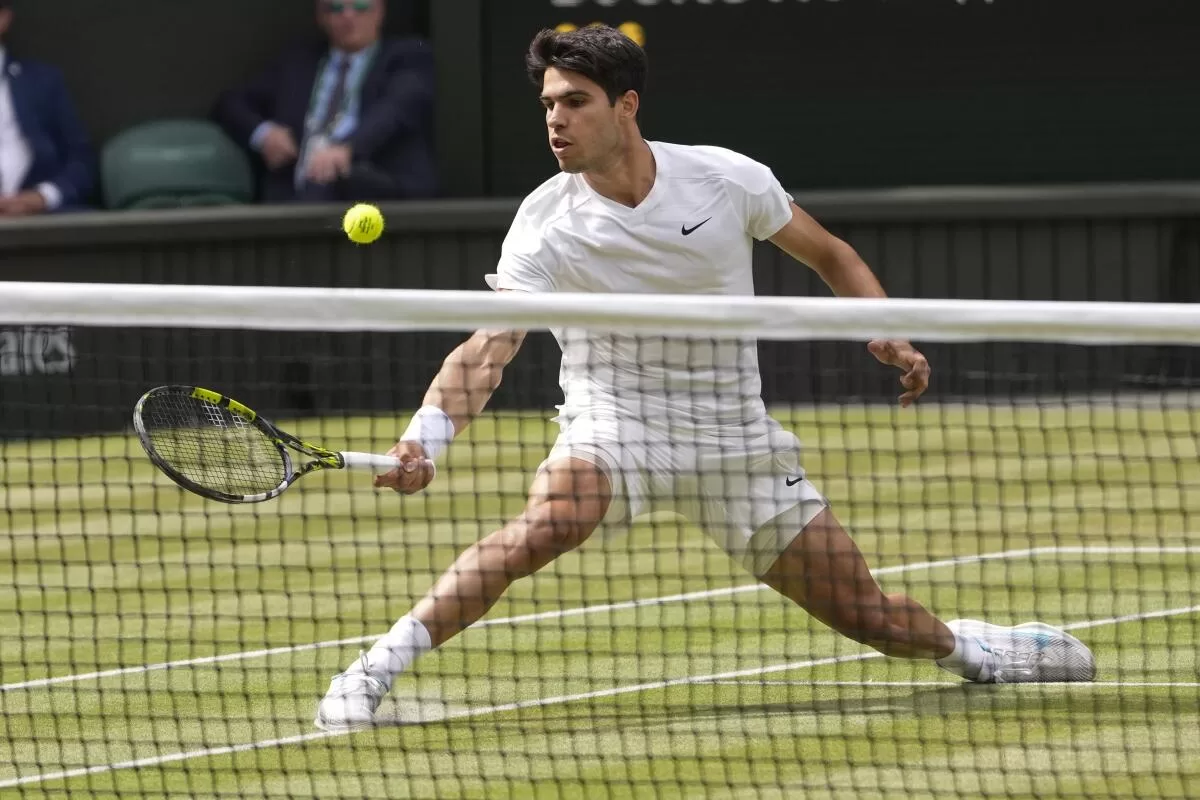For Carlos Alcaraz, there was one brief blip in the Wimbledon men’s final against Novak Djokovic on Sunday, one five-point stretch that took him from the verge of victory to close to a collapse.
After dominating for the initial two sets, then seemingly withstanding a surge from Djokovic in the third, Alcaraz was a point from the championship while serving at 5-4, 40-love. But he double-faulted. Then missed a backhand. Then a volley. Then a forehand. And another forehand. Suddenly, it was 5-all. Suddenly, Alcaraz appeared rattled. Suddenly, Djokovic had hope. Suddenly, there was intrigue.
It would require an additional 20 minutes to close things out, and while Alcaraz is certainly a kid in a hurry, he steadied himself and never wavered again, defeating Djokovic 6-2, 6-2, 7-6 (4) to collect a fourth Grand Slam title at age 21.
“For me,” Alcaraz said after receiving the gold champion’s hardware from Catherine, the Princess of Wales, “this is the most beautiful tournament, the most beautiful court and, obviously, the most beautiful trophy.”
It was a rematch of last year’s championship match on the grass of the All England Club, which Alcaraz won in five sets. This one was much easier for Alcaraz, at least until he stumbled while holding those three match points at 5-4.
“It was difficult for me,” said Alcaraz, who is 4-0 in major finals, including at the 2022 U.S. Open as a teenager. “I tried to stay calm. I tried to stay positive.”
He did, indeed, regroup and picked up a second major title in a row after last month’s triumph on the clay at the French Open.
The 37-year-old Djokovic, wearing a gray sleeve on his surgically repaired right knee, was denied in his bid for an eighth Wimbledon title and record 25th major overall. He tore his meniscus at Roland Garros on June 3 and had an operation in Paris two days later.
“When I reflect … on what I’ve been through,” Djokovic said, “I have to say that I’m very satisfied.”
Less than six weeks after surgery, Djokovic was hardly at his best Sunday on a cloudy afternoon at Centre Court — and Alcaraz certainly had something to do with that.
“Especially in the first couple of sets, the level of tennis wasn’t really up to par on my side,” said Djokovic, whose two children were in his guest box. “He had it all today. I tried to push him. … But it wasn’t meant to be.”
In the third set, Djokovic got his only break of serve all day to make it 5-5, as spectators chanted his two-syllable nickname — “No-le! No-le!” — while others replied with choruses of “Let’s go, Carlos! Let’s go!”
But in the ensuing tiebreaker, Alcaraz earned his fourth match point and stayed cool as can be. Soon he was climbing through the stands to hug his coach, Juan Carlos Ferrero, and others.
Just under 2 1/2 hours earlier, at the outset, the opening game appeared to portend an engrossing, back-and forth contest — and a long one, perhaps worrying some folks about getting to a pub or couch in time to see England face Spain in the men’s soccer European Championship final in Germany on Sunday night. Alcaraz, of course, had a rooting interest.
Carlos Alcaraz reaches for a forehand volley at the net during his victory over Novak Djokovic on Sunday at Wimbledon.
(Alberto Pezzali / Associated Press)
All told, that game consisted of seven deuces and 20 points across a hair shy of 14 minutes, containing brilliant moments by both. Sprinting, sliding, stretching defense by Djokovic. Return winners by Alcaraz. When he slapped a strong reply to a 125 mph (202 kph) serve and drew a wide forehand from Djokovic, Alcaraz cashed in his fifth break chance.
That, it turned out, was the most competitive portion of the proceedings until the third set.
Not to say there weren’t hints of brilliance the rest of the way. Just the outcome never really seemed in dispute.
Djokovic double-faulted to hand over a 5-1 lead in the first set. He put a volley into the net to fall behind by a break to begin the second set, then double-faulted to end that one.
This was not the body-contorting, get-to-everything Djokovic everyone is accustomed to seeing. There’s his age, first of all, and the matter of his knee, which raised serious questions about whether it would be possible to even participate at Wimbledon.
By his account, Djokovic felt free of pain and able to move with his usual verve by only his third or fourth match of the fortnight. Against Alcaraz, Djokovic occasionally hopped awkwardly when he landed after serving or stepped gingerly — as if barefoot on a beach’s hot sand — between points.
Missing volleys he usually makes, Djokovic won just 27 of 53 points when he went to the net. After netting a volley to close one early 11-stroke exchange, Djokovic sighed and walked to his sideline seat to grab a purple-and-green towel for dabbing at sweat. His facial expression was saying: “Come on, Carlitos, pick on someone your own age.”
Alcaraz was outstanding in pretty much every way, from the basic to the sorts of shots no one else would even try. Once, he leaped and wrapped his racket all the way around his back to get the ball over the net, although Djokovic did put an overhead away to get that point. Alcaraz ran wide of the doubles alley for forehand winners. Claimed points via drop shots. Smacked serves at up to 136 mph (219 kph). Accumulated 14 break points, converting five, and faced just three.
What can’t Alcaraz do?
Two days before the final, Djokovic paid Alcaraz quite a compliment, saying: “I see a lot of similarities between me and him.”
So true. And remember: Alcaraz is just getting started.
“I want,” Alcaraz said, “to keep going.”
